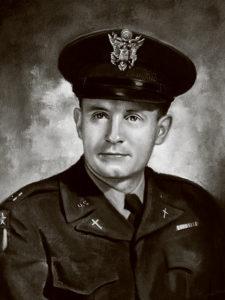
Most people pronounce it Kuh-pone, but the proper pronunciation is Kuh-pawn. Your first exposure to Kapaun Air Station is likely picking up your inbound vehicle. Why is this small plot of land, on a hill overlooking Vogelweh, called Kapaun?
The station is named after Medal of Honor recipient U.S. Army Chaplain (Capt.) Emil Joseph Kapaun, born in the U.S. heartland of Pilsen, Kansas, more than 100 years ago.
Kapaun found his calling to God early in life, and soon after becoming a Catholic priest towards the end of World War II, he asked his bishop’s permission to join the U.S. military. The bishop agreed, and Kapaun found himself in India for the last year of the war.
After the war, Kapaun returned to his home church to continue his life as a priest in the civilian world. When the Korean conflict flared, Kapaun deployed to Korea and the U.S. Army’s 8th Cavalry. On Nov. 1-2, 1950, his unit was ordered to retreat after being overrun by the Chinese People’s Volunteer Army. Disobeying the order, he remained with the 3d Battalion and was captured along with many who survived the battle. Those survivors, many severely wounded, marched 87 miles to Prison Camp 5, Pyoktong, North Korea, near the Chinese border.
Having cared for and cleaned the wounded, stolen food from the guards, and prayed with and for his fellow POWs, giving them spiritual hope, Kapaun succumbed to his own malnutrition and pneumonia and was taken to the death house. He told his fellow prisoners not to be sad, because he was going to where he always wanted to go. Kapaun died May 23, 1951.
Buried in a mass grave near the Yalu River, his unknown remains made their way to Hawaii’s National Memorial Cemetery of the Pacific in 1956. By the grace of God, Kapaun’s remains were identified in March. Kapaun was definitively home on U.S. soil.
On Sept. 25, Kapaun will make his way from Honolulu, Hawaii, to Wichita, Kansas, on a 12-hour flight. A procession will transport him from the airport to his home in Pilsen for a private homecoming the following day. Other events include a live-streamed public rosary and vigil in Wichita on Sept. 28 (https://www.youtube.com/user/dioceseofwichita), and his funeral and interment on Sept. 29.
Here is a snippet of significant events since Kapaun’s death:
1993 Pope John Paul II declares Father Emil a Servant of God; step one of four towards sainthood in the Catholic Church.
2013, April, President Barack Obama posthumously awards Medal of Honor to Kapaun
2021, July, South Korean President Moon Jae-in presents Kapaun South Korea’s highest military award.
I encourage you to consciously think of Father Emil Joseph Kapaun, an American hero, each time you drive onto Vogelweh and Kapaun Air Station.







